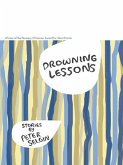Caught in the muddle of modern life, eyes gazing at the middle distance, the characters in Silent Retreats search, down roads paved by custom and dotted by the absurd, for escape, refuge, or, at least, merciful diversion.
Many of the men in Philip Deaver's stories, having drifted out of their native Illinois to the far corners, find comfort from empty jobs and blank relationships in healing, often hilarious, seductions. In "Why I Shacked Up With Martha" a distracted DC executive pierces the gray blur of his glass box on Dupont Circle with illicit, painfully superficial notes passed to his beautiful, liberated coworker. In "Marguerite Howe," a businessman from Texas at a cocktail party in New Haven accosts his hostess, blindly convinced that she is the woman of his college day-dreams at the University of Virginia. And, in Nebraska, a defeated legal aid attorney escapes the cold wind of failure and a near suicidal woman in the deep warmth of "Fiona's Rooms."
Other characters, still within the radius of central Illinois, tread through the familiar scenery of the past, measuring with landmarks of memory the distance, and yet the circularity, time has wrought in their lives. In the title story, Martin Wolf-overcome with tears during the morning commute and craving connection and the cleansing rituals of his Catholic youth-learns from the words of a parish priest, crackling through the lines of a pay phone as cars screech by on Roosevelt Road, that silence has become self-indulgent. And in "Infield," Carl Landen savors the well-ordered tableau of the Pony League diamond where he played shortstop and where his son now plays that position. Recalling the ache in the shoulder after an overhand throw, seeing in his mind the figure of his father intruding at the edge of the field, he relaxes the pain of generations, the soreness that comes from knowing a town too well.
A well-known theme of Philip Deaver's stories is "what happened to men after what happened to women." The stories in Silent Retreats trace the tentative journeys of men as they redefine who they are in a changed world while still coping with memory and desire in the old ways. Above all, these stories chronicle a search for absolution-for the elusive freedom lurking among the very syllables of the word.
Many of the men in Philip Deaver's stories, having drifted out of their native Illinois to the far corners, find comfort from empty jobs and blank relationships in healing, often hilarious, seductions. In "Why I Shacked Up With Martha" a distracted DC executive pierces the gray blur of his glass box on Dupont Circle with illicit, painfully superficial notes passed to his beautiful, liberated coworker. In "Marguerite Howe," a businessman from Texas at a cocktail party in New Haven accosts his hostess, blindly convinced that she is the woman of his college day-dreams at the University of Virginia. And, in Nebraska, a defeated legal aid attorney escapes the cold wind of failure and a near suicidal woman in the deep warmth of "Fiona's Rooms."
Other characters, still within the radius of central Illinois, tread through the familiar scenery of the past, measuring with landmarks of memory the distance, and yet the circularity, time has wrought in their lives. In the title story, Martin Wolf-overcome with tears during the morning commute and craving connection and the cleansing rituals of his Catholic youth-learns from the words of a parish priest, crackling through the lines of a pay phone as cars screech by on Roosevelt Road, that silence has become self-indulgent. And in "Infield," Carl Landen savors the well-ordered tableau of the Pony League diamond where he played shortstop and where his son now plays that position. Recalling the ache in the shoulder after an overhand throw, seeing in his mind the figure of his father intruding at the edge of the field, he relaxes the pain of generations, the soreness that comes from knowing a town too well.
A well-known theme of Philip Deaver's stories is "what happened to men after what happened to women." The stories in Silent Retreats trace the tentative journeys of men as they redefine who they are in a changed world while still coping with memory and desire in the old ways. Above all, these stories chronicle a search for absolution-for the elusive freedom lurking among the very syllables of the word.
Dieser Download kann aus rechtlichen Gründen nur mit Rechnungsadresse in A, D ausgeliefert werden.









